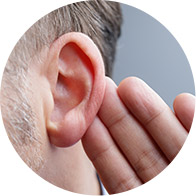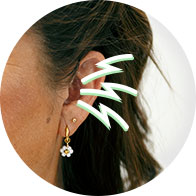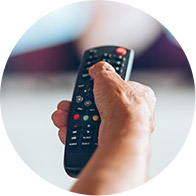
Helping someone with hearing loss
An individual's hearing loss can affect everyone around them, and their family and friends will likely feel the benefits when they seek treatment. On this page, you can learn how to help your loved one on their journey to healthy hearing.
6 signs your loved one has hearing loss
Do you recognize any of these symptoms in a friend or loved one?
If you get familiar with the signs of hearing loss, you can better help your loved one on their journey to better hearing.

Behaviour changes can be a sign of hearing loss
If someone you know is suffering from untreated hearing loss, you might notice some changes in their behaviour. These may include:
- Withdrawal from social activities
- Feelings of shame, guilt or anger
- Becoming self-critical, frustrated and depressed
How to help someone with hearing loss

Request a consultation for someone you love
Help your loved one take the first step to better hearing by scheduling an appointment. The booking is free of charge, and there is no obligation to purchase.

Consequences of untreated hearing loss
In order to increase your loved one's awareness about their potential hearing loss, tell them about the benefits of seeking hearing care. You may also wish to share some of the short and long-term consequences of untreated hearing loss, such as:
- Increased mental load
- Social isolation and depression
- Poor balance and fall-related injuries
- Anxiety and Alzheimer's disease
6 benefits of getting hearing loss treatment
7 habits for good communication
There are a number of ways to make it easier to communicate with those who have a hearing loss. Follow these seven habits for clearer communication:
- Gain the person’s attention before speaking so that they’re ready to look at you and focus on what you’re saying
- Speak clearly and at a natural pace; don’t shout
- Move closer and sit where your face is lit, so that your facial expressions are easy to read.
- Try not to talk while chewing or smoking, and be sure not to hide your mouth or chin while speaking.
- Reduce background noise, turn down the music or TV, or find somewhere quiet to talk.
- If you are in a group, try not to interrupt each other.
- Instead of repeating yourself, try to rephrase the sentence.
Tips for talking to a friend about hearing loss:
Sources
1. Amieva, H., Ouvrard, C., Meillon, C., Rullier, L., & Dartigues, J. (2018, January 03). Death, Depression, Disability, and Dementia Associated With Self-reported Hearing Problems: A 25-Year Study. Retrieved from https://academic.oup.com/biomedgerontology/article/73/10/1383/4783130
2. Lin, F. R.. (2011, February 1). Hearing Loss and Incident Dementia. Archives of Neurology. https://jamanetwork.com/journals/jamaneurology/fullarticle/802291.
3. Lin, F. R., & Ferrucci, L. (2012). Hearing loss and falls among older adults in the United States. Archives of internal medicine, 172(4), 369–371. https://doi.org/10.1001/archinternmed.2011.728
4. Rönnberg J;Lunner T;Zekveld A;Sörqvist P;Danielsson H;Lyxell B;Dahlström O;Signoret C;Stenfelt S;Pichora-Fuller MK;Rudner M;. (n.d.). The Ease of Language Understanding (ELU) model: Theoretical, empirical, and clinical advances. Retrieved from https://pubmed.ncbi.nlm.nih.gov/23874273/















